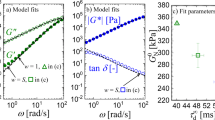Summary
Curve fitting, based on the method of least squares, have been carried out on viscosity/temperature data for fluids and solutions. In the course of this work, a number of exponential equations have been tested. It was determined that the WLF equations should not be used since the viscosity temperature coefficients are dependent upon the reference temperature. On the other hand, a thorough statistical analysis shows that it is not possible to make a clear-cut distinction among the 3 parameter exponential equations. Fitting calculations should take into account the fact that most experimental data is of varying goodness and must therefore be weighted. The use of a 4 parameter equation, for example, the Hybrid equation, can only under certain conditions be considered the best viscosity/temperature equation since the statistical variables are not that much better as for 3 parameter equations.
Zusammenfassung
Ausgleichsrechnungen, die auf der Methode der kleinsten Fehlerquadrate beruhen, sind an Viskositäts/TemperaturMeßdaten von Flüssigkeiten und Lösungen durchgeführt worden. Dabei sind eine Reihe von Exponentialgleichungen getestet worden. Es stellte sich heraus, daβ die WLFGleichung nicht angewendet werden sollte, weil die Temperaturkoeffizienten der Viskosität abhängig sind von der Bezugstemperatur. Andererseits ergibt eine gründliche statistische Analyse, daß eine eindeutige Unterscheidung zwischen den 3-parametrigen Exponentialgleichungen nicht möglich ist. Bei Ausgleichsrechnungen sollte die Tatsache berücksichtigt werden, daß die meisten Meßdaten unterschiedlich fehlerhaft sind und somit gewichtet werden müssen. Die Anwendung einer 4-parametrigen Gleichung, z. B. die der Hybrid-Gleichung, kann nur bedingt als beste Viskositäts/Temperatur-Gleichung angesehen werden, da die statistischen Größen nicht um so viel besser sind als bei den 3-parametrigen Gleichungen.
Similar content being viewed by others
References
Melsheimer, J., K. Langner, Ber. Bunsenges. Phys. Chem.83, 539 (1979).
Bevington, P. R., Data Reduction and Error Analysis for the Physical Sciences, McGraw-Hill, (New York, N.Y., 1969).
Teramoto A., S. Kusamizu, H. Tanaka, Y. Murakami, H. Fujita, Makromol. Chem.90, 78 (1966).
Schichman, S. A., R. L. Amey, Phys. Chem.75, 98 (1971).
Langner, K., Dissertation, TU Berlin (1979).
Author information
Authors and Affiliations
Additional information
With 9 tables
Rights and permissions
About this article
Cite this article
Melsheimer, J., Langner, K. On the difficulties of evaluating viscosity/temperature data. Colloid & Polymer Sci 258, 160–167 (1980). https://doi.org/10.1007/BF01498275
Received:
Issue Date:
DOI: https://doi.org/10.1007/BF01498275




